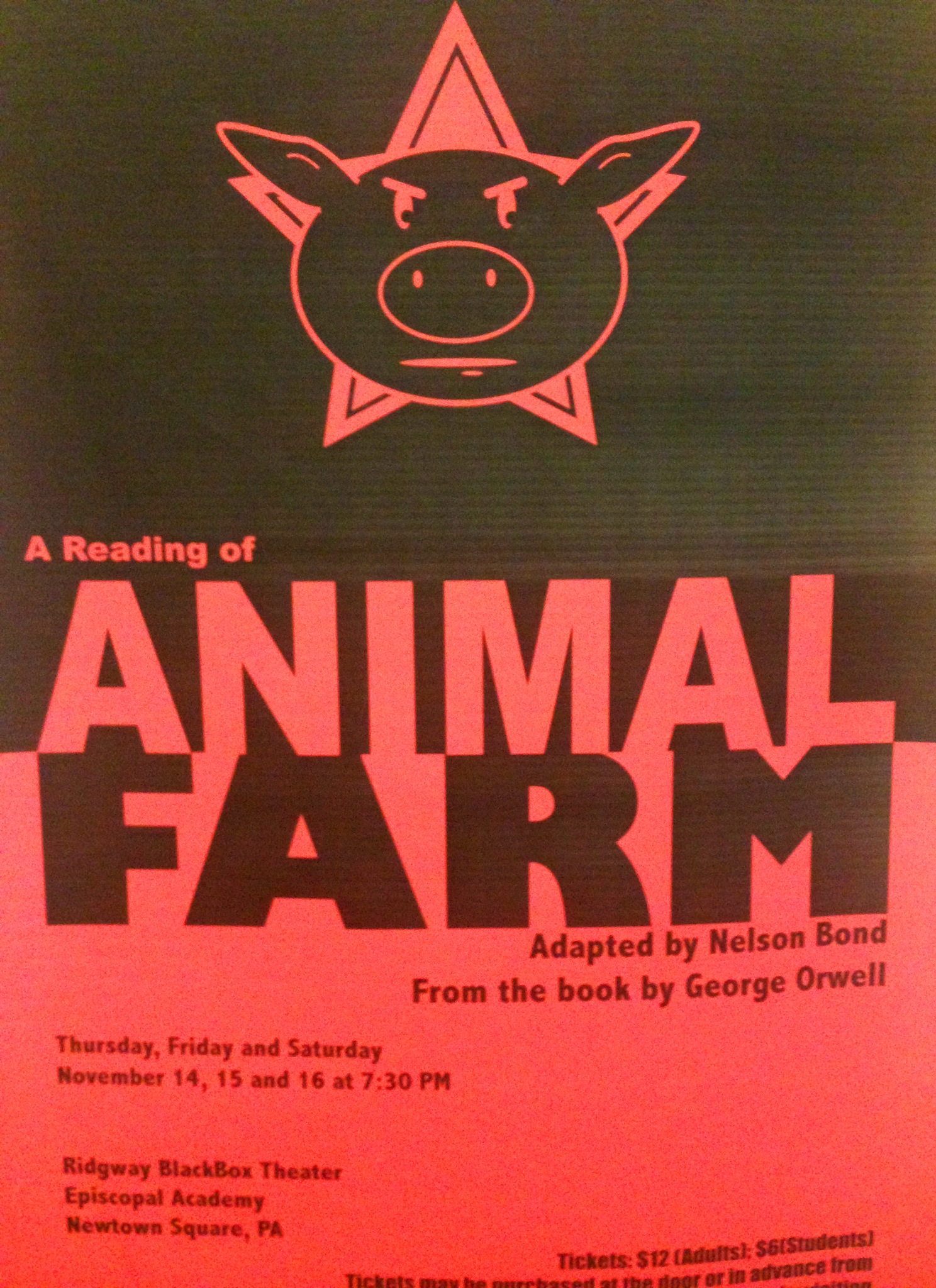Jessica Bai ’16: The Episcopal Academy Community Players will perform Nelson Bond’s adaptation of Animal Farm on November 14th, 15th, and 16th at 7:30 pm in the Ridgeway Blackbox Theater. Founded by a well-known actor and former student, John Carradine, the group has been in existence for about forty years, and the money it earns goes to the Episcopal Academy’s Parents Association. The association then uses this money to help departments that are in need.

The director for this year’s show is Barry Brait, a retiree who has directed the group in the past. Brait is part of the Screenwriters Guild and has acted in a number of Philadelphia based movies over the years. The cast for the Animal Farm performance is a combination of alumni and past parents. Everyone who is a part of this particular cast has been in the group for at least twenty years. The group used to have lots of participation from parents, faculty, alumni, and staff, but over the years participation has decreased.
“We try to attract new people from new families. We don’t have as much heavy involvement from the faculty as we used to unfortunately. By doing these things, we try to attract the kids to perform as well. In the past we have had former headmaster James Crawford, and the drama faculty used to perform with us. Some of us were professional actors, now we’re all really just amateurs because we have other professions,” stated John Orr P ’07, the main narrator for the play.
The production for Animal Farm hopes to follow the book’s plot very closely. It will be broken up into seven readers, who each have multiple parts. Everyone has both a character voice and a narrating voice. The story will not be told by one individual, but instead each actor will narrate a particular portion of the play. “Animal Farm has a lot of messages, and it’s up to us to give our own personal interpretations. It’s described as a fable with a sting or a fable that isn’t cozy but has twists and turns. It’s really about Communism and how it is a nightmare,” said Lita Haack, a past EA parent who narrates and plays the part of Muriel the Goat.
“You see all these animals dominating the area where they’re all living. They’re all really excited in the beginning, and they all think that man is bad and that they’re better than them” added Haack. “By the end of the show, they realize that they’re not better than man, but the pigs have taken over. The other animals, lower ones like Muriel the Goat, are being used by the pigs that become very smart and very greedy.”
The novel by George Orwell is a major allegorical piece and truly one of the most iconic novels of the 20th century. In the 50s and 60s, Nelson Bond was a very well-known underground writer, mainly writing sciencefiction fantasy novels and the adaptation for the theater. His is the adaption that the Episcopal Academy Community Players will be performing.
“It is a very curious adaptation because you hear it from different perspectives,” stated Orr. “There will be some sound effects and lighting effects, but very little movement, for we will be performing or standing or sitting on stools with the scripts in front of us. There will be lots of animal sounds.”
Haack clarified that “The technical word for what we’re doing is called a ‘stage reading’. The play is pretty true to the novel. We divided up some of the narrator parts because the narrator is a large part. We have a couple extra characters because we wanted to include everyone who auditioned. The original script has seven actors. Each of these actors plays two to three characters. In our production, we have three women and seven men.”

As for the theatre itself, Haack described the set as a “simple one, in the Ridgeway Blackbox, that will be altered to look like a barn. We will sit on stools and will be dressed alike. There will be some red in our costumes that is supposed to represent Communism. It will be very simple, but very powerful at the same time.”
Although Orr mentioned that this will be the 40th year that the Episcopal Academy Community Players performs, “This is the first time we’ve done anything quite like this. Normally, we perform a stage production.” Orr continued by saying, “We also used to do them at Merion for many years. This is probably our fourth to fifth time performing at Newtown Square in the Blackbox. We have given around $150,000 back to the school.”
The Episcopal Academy Community Players encourage all students who have read or are reading Animal Farm to come see the performance. “We just want everyone to come and attend and to learn something from this,” encouraged Haack. “It’s a tale of tragedy in a mythical barnyard.”